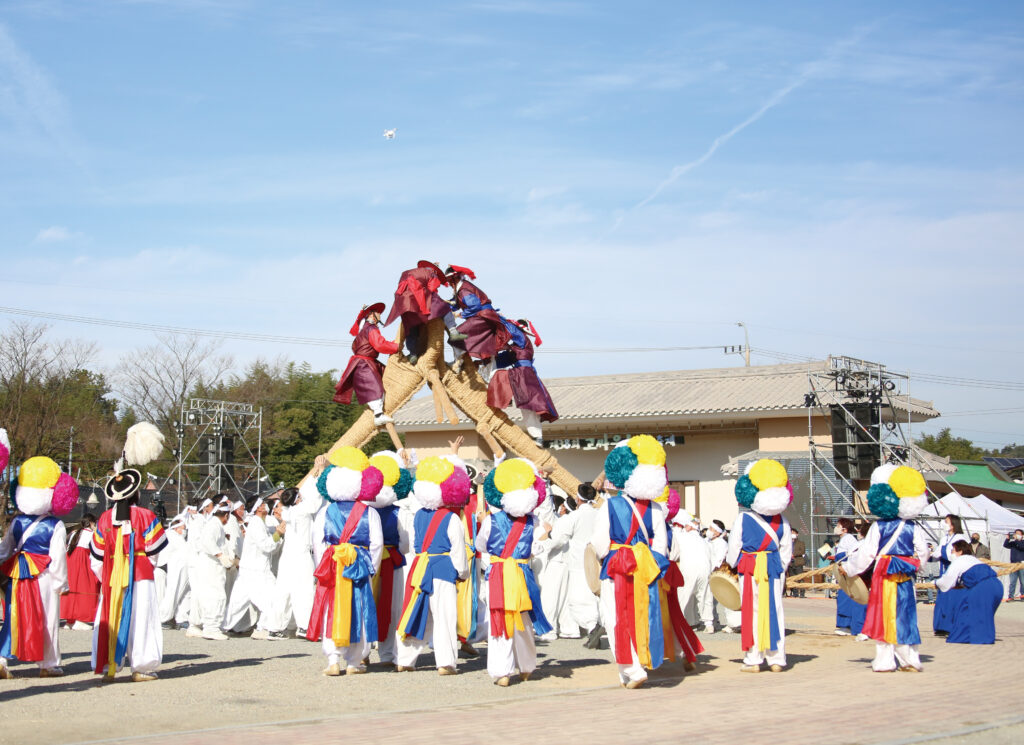Let the Fight Begin – Gossaum-nori in Chilseok-dong
By Julien Laheurte

In South Korea, the new year is celebrated in two distinct ways. The first, less traditional method involves observing New Year’s Eve according to the Gregorian Calendar, a solar dating system originally used by Catholic European countries and now globally adopted. The second method aligns with the Chinese lunar calendar, with the new year for 2024 set to occur on the 10th of February from the Gregorian perspective.
Two major celebrations are linked to the lunar new year. Seollal (설날), marking the first day of the lunar calendar, is primarily a family gathering where individuals return to their hometowns to partake in ancestral rites. The second celebration is Jeongwol Daeboreum (정월대보름), observed on the 15th day of the lunar calendar’s first month, signifying the year’s first full moon. During Jeongwol Daeboreum, cities, towns, and villages organize festivities aimed at bringing good fortune and warding off evil spirits.
For Jeongwol Daeboreum, a three-day celebration is planned in Gwangju. Hosted annually by the Gossaum-nori Preservation Society (고싸움놀이보존회), the 41st edition of the Gossaum-nori Festival (고싸움놀이축제) will unfold in Nam-gu, Chilseok-dong (Otdol Village) from February 23 to 25. The agenda includes fireworks on the 23rd and traditional games and experiences on the 24th and 25th, featuring a bonfire and loop fights.
Gossaum (고싸움, loop fight) is a compound term consisting of go (고), derived from otgoreum (옷고름), which refers to the ribbon bow on traditional Korean costumes, and ssaum (싸움), meaning “fight.” This term signifies a match or fight between two teams pulling on knotted ropes. The game’s rules are simple: adult men form two teams and engage in playful collisions, with the last team standing recognized as the winner.
Played for over 800 years, gossaum is predominantly enjoyed in the Jeolla region. Beyond its playful nature, the outcome of gossaum is traditionally believed to predict the agricultural fortune of the year. The two sides are named su-jul for the eastern team and am-jul for the western team. Victory by the am-jul team is thought to ensure a bountiful harvest, highlighting the agricultural symbolism embedded in the game. Additionally, gossaum serves as a means to foster unity and cooperation among male villagers.
Following a period of obscurity during the Colonial Period (1910–1945), gossaum experienced a revival in the 1960s and was designated a National Intangible Cultural Asset in 1971. The Gwangju Gossaum Festival, first held in 1982, continues to attract an increasing number of visitors each year. During the festival, gossaum takes on a more playful and humorous tone compared to its original version, with the primary objective being to entertain people in a lighthearted and joyous manner.
The second main event of the festival is daljip-taeugi (달집 태우기), a traditional custom associated with the celebration of Jeongweol Daeboreum. The term daljip-taeugi, translated as “burning the moon house,” involves constructing a large bonfire to mark the arrival of the first full moon of the year.
This ritual is believed to bring good weather and prosperity for the upcoming year. When crafting the moon house, it is customary to position the door eastward, aligning with the moon’s rising direction. Once the moon appears in the eastern sky, the moon house is set ablaze. Depending on the village, bamboo, along with pine branches, might be added to the moon house. The loud noise produced by the burning is thought to drive away malevolent spirits.
Though the detailed origins of daljip-taeugi lack documented records, speculation places its practice centuries in the past. The roots of this ritual extend to the northeast part of Jeollanam-do, encompassing areas such as Gurye and Suncheon. In Gwangju, the celebration of daljip-taeugi was not a widespread tradition until the inception of the Gossaum-nori Festival in 1982. Since then, it has ascended to become a pivotal element of the festival’s festivities.
Photo courtesy of The Gossaum-nori Preservation Society
The Author
Julien Laheurte is a French literary translator who has been residing in South Korea for the past two years. After the completion of his master’s degree in Seoul, he moved to Gwangju with the intention of delving deeper into the history of the May 1980 democracy movement. His goal is to translate literary works that shed light on this pivotal moment in Korean history.






